Ayers and Dohrn at Hatcher Library
On Monday evening at the University of Michigan’s Hatcher Graduate Library, Bill Ayers and Bernardine Dohrn addressed the 300-400 people who had packed into the space, answered written questions and signed copies of their new book, “Race Course: Against White Supremacy.”
Ayers had gained renewed notoriety during the presidential campaign, through the speculation about a connection between Ayers and then presidential hopeful Barack Obama. When Republican candidate for vice-president Sarah Palin spoke of Obama “palling around with terrorists,” Ayers was the guy she meant – Ayers was a member of the radical 1960s group the Weather Underground. (Ayers rejected the label “terrorist” on Monday.)
Although it was Ayers and Dohrn who headlined the event, the story that The Chronicle found was in the people who attended, many of whom were linked in somewhat unpredictable ways.
Take Jim Manganello, whose real interest is in directing theater, but who’s completing a teaching certificate at UM, having already earned his undergrad degree. Part of the reason he went to hear Ayers and Dohrn speak is that he’s taking a course in the history of American radicalism, and his professor mentioned the event in class.
Manganello rents the place he lives from another attendee, Roger Manela, who now is a social worker and also the guy who recruited Carl Oglesby to Students for a Democratic Society. That recruitment is described in detail in Chapters 2 and 3 of Oglesby’s “Ravens in the Storm.” Oglesby served as the president of SDS from 1965-66.
The first president of SDS (elected in 1960) was also on hand Monday evening in the form of Alan Haber. Haber remains active in the Ann Arbor community, currently focusing on the Megiddo Peace Project.
Haber’s high school teacher at University High was Scott Westerman. Westerman was superintendent of Ann Arbor schools when Ayers ran for school board. Westerman was also there for Ayers’ talk and stopped by the book-signing table afterwards to chat with Ayers and Dohrn.
And even if Ayers hasn’t been palling around with Barack Obama, it might be fair to say that he’s palled around with Karl Pohrt, owner of the independent bookstore Shaman Drum. On Sept. 11, 2001, Ayers had been scheduled to give a reading for “Fugitive Days” at the store when the events of that day canceled the reading. And Pohrt was at Hatcher on Monday – not really as an attendee, but as part host. Monday’s event was sponsored by Shaman Drum, and it was Pohrt who had pitched the idea to Paul Courant, University Librarian and UM Dean of Libraries, that UM could provide an appropriately-sized venue. Pohrt made introductory remarks on Monday.
That brings us back around to Jim Manganello, whose connection to Karl Pohrt is that he just finished a 3-week temporary stint working the textbook floor at Pohrt’s Shaman Drum.
Not everyone who attended could be linked up in similar fashion.
Oscar Whitehouse was there because he had no choice – he looked to be only a couple months old and was there with his mom, Melissa Stewart. Stewart said she and her husband were there because they wanted to hear Ayers speak first-hand. She didn’t think that the hype surrounding Ayers was fair, and after the talk concluded that their notion of Ayers was correct: “He’s really not crazy.”
Geoffrey Williams, a UM undergrad toting a giant chemistry textbook, said he would not be heeding Bill Ayer’s advice to go to Shaman Drum and buy a book (not necessarily his own) and read it. He was, however, planning to go to Shaman Drum afterward – to by a ticket to Homegrown: Poetry from the Ann Arbor Underground, which will be performed this Wednesday, Jan. 28, at Lydia Mendelssohn Theater in the Michigan League. [confirm date]
Julie Herrada, curator of the Labadie Collection at the UM library, was in attendance Monday. Courant mentioned her in his introductory remarks because her exhibit, “The Whole World Was Watching: Protest and Revolution in 1968, Selections from theLabadie Collection,” was connected in topic and space to Monday’s talk. It had been on display in the same Room 100 at Hatcher Graduate Library through Dec. 19, 2008.
Ken Magee, new director of UM’s Department of Public Safety, was there partly by virtue of his position. It was his responsibility, he said, to make sure it was a safe environment. But before his long career as a federal agent, he had grown up in Ann Arbor. He remembered riding his bicycle through the Diag. And he had a recollection of the events of the late ’60s in Ann Arbor, even if he had no recollection of Bill Ayers as a person.
Rich Tolman, a professor at UM’s School of Social Work, was hanging around after most of the room had emptied, waiting for the long line at the book signing table to slowly shrink. Tolman is a former colleague of Ayers at the University of Illinois at Chicago – their offices were on the same hallway. Tolman had exchanged some emails with Ayers before his arrival, and depending on the lateness of the hour when the signing was done, the two were perhaps heading out for a drink.
When The Chronicle left Hatcher Library and Tolman, he was sussing the problem of what downtown establishment would still be open past 11 p.m. Otherwise put, where do you take Bill Ayers for a drink in downtown Ann Arbor?
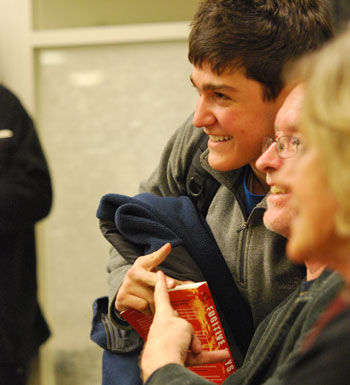
Bill Ayers was entreated by several young people to pose for pictures with their newly-acquired book while flashing the peace sign. One young man (not this one) declared he would be finding Ayers on Facebook and friending him.





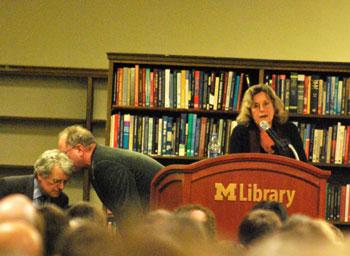
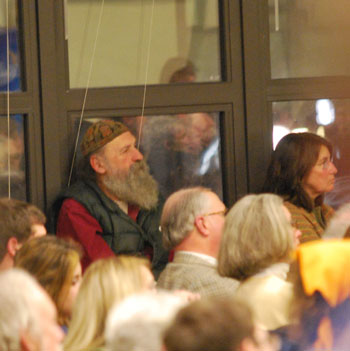
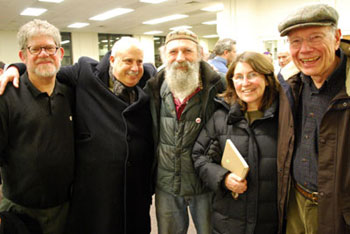
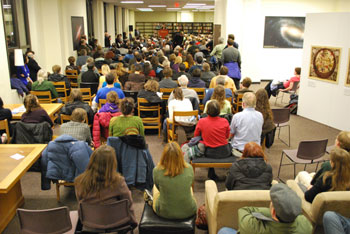
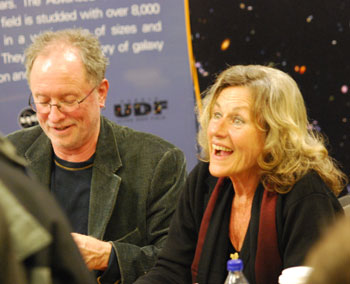


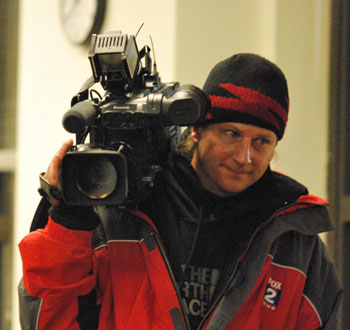
“Otherwise put, where do you take Bill Ayers for a drink in downtown Ann Arbor?”
Nowhere. I wouldn’t shake his hand, let alone break bread with him.
I attended this event because I felt that anyone considered that dangerous by the right was worth listening to. I appreciated Bill’s thoughtful and holistic perspectives, not defensive, but really working to reframe the questions and concerns that we now face. It isn’t often that I’ve heard such an optimistic radical organizer. And his perspectives on extremism were also helpful. The importance of continuing self evaluation and admitting and learning from your mistakes. Bernadine was new to me, and her keen intelligence and passion about youth activists and education were lovely.
If Palin helped to give Bill and Bernadine greater exposure and a wider audience that may end up being a very good thing. A larger conversation about the ’60s and the war in Vietnam may be profoundly healing, and their perspectives and insights are well considered and welcome. They certainly add to the understanding and move the conversation forward rather than just continuing the arguments of who was right and wrong.
yes, Linda, to add a little nuance to my emotional comment, if I had known about the event, I might have been interested in going, and I certainly don’t begrudge anyone who did. Also, I entirely agree that it would be interesting and thought-provoking to hear him speak. I have read several of his editorials during the recent campaign, and while I disagreed with some of what he said, it didn’t cause me to froth at the mouth.
I thought the decisive moment in the electoral campaign was when he attacked Obama for his links to Ayers in the second debate, it made McCain look petty, and Obama’s answer was perfect (and, alas, highly revealing): “my advisers will be people like Paul Volcker and Warren Buffet.”
Some of Ayers’ actions and beliefs cross my personal “line in the sand,” to the point where I find his version of patriotism and respect for the law deeply offensive, but, as my first comment (cryptically) implied, I think the apropriate remedy, at this stage, is not hysteria, but mindful choice to look elsewhere going forward.
I named my dog, Bernie, after Bernardine Dohrn after seeing her FBI wanted poster at the Post Office in 1972
The “as-yet-unidentified” person is Odile Hugenot Haber, a long-time peace activist nationally and in Ann Arbor. She’s also Al Haber’s wife, and my neighbor.
Re: comment [5]
Thanks, Barbara. The caption is now complete.
Bill Ayers ran for the school board in 1968 at the age of 23. He lived on Felch Street and was the director of an experimental school for children. Here are two quotes from him in an Ann Arbor News article announcing his candidacy, “The crying need is to liberate the kids from the suffocating regimentation that passes for education” and “The kind of meaningful education envisioned here cannot be attained without radical changes in the structure of our whole society.”
Bill Ayers finished a distant last among the field of eight candidates, receiving less than half as many votes as the seventh place candidate. The three successful candidates were Harold Lockett, Richard Wood, and Ted Heusel.
The public figure who Mr. Ayers and Ms. Dohrn could most accurately be compared is Timothy McVeigh. They’re just not as competent. Fortunately for all of us, the “Weather Underground” was more comic opera compared to Mr. McVeigh’s tragedy. For a more thorough understanding of Ayers, Dohrn, McVeigh, Rudolph Hess, etc., read Eric Hoffer’s fine book “The True Believer.”
Ayers and Dohrn were in Ypsilanti earlier in the day, and after an appearance at EMU, they apparently stopped by Beezy’s Cafe. According to cafe owner Bee, “Bernadine was holding a ‘venti’ Starbucks cup the whole time she was there. Ouch, stick it to the man until it’s time to get coffee.”
See: this link